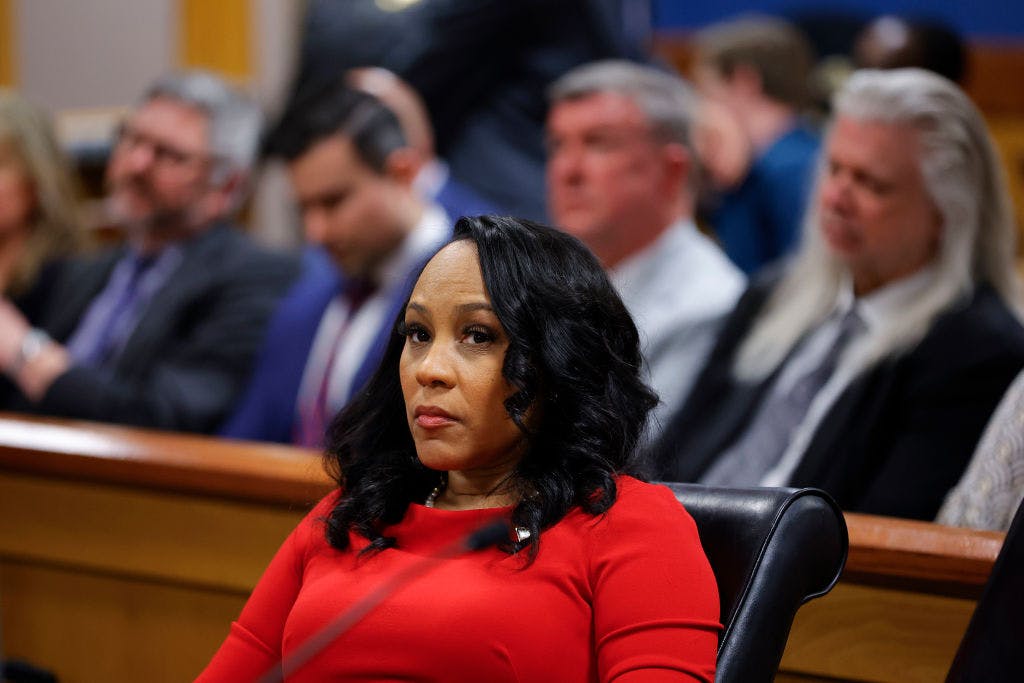Trump Moves To Appeal Refusal of the Court To Disqualify Fani Willis, Wants DA and Her Office Dismissed
It’s unclear, though, whether the judge will allow the appeal to go forward.

The filing by President Trump and his camarilla for leave to appeal Judge Scott McAfee’s ruling that District Attorney Fani Willis can prosecute the case against the former president and 18 others underscores that the prosecutor’s problems are hardly past.
Georgia law mandates that if the ruling is to be appealed before trial, the judge would have to grant a “Certificate of Immediate Review,” which would allow the issue to be taken up by an appellate court, if it so chooses. Mr. Trump et al. call the decision to allow Ms. Willis to stay on one of “exceptionally great importance to this case, substantially impacting Defendants’ rights to due process.”
While Judge McAfee declined to disqualify Ms. Willis, he did order that she and her former lover and special prosecutor, Nathan Wade, could not jointly lead the case. Mr. Wade, who has been paid more than $650,000 by Ms. Willis’s office, promptly resigned so that his erstwhile girlfriend could stay on. Judge McAfee criticized the “odor of mendacity” that he found characterized their account of when their affair began.
The motion for a certificate acknowledges that the “Court declined to disqualify District Attorney Willis, finding that eliminating only the Special Assistant District Attorney would cure the lingering appearance of impropriety.” The motion contends that the “resignation of Mr. Wade is insufficient to cure the appearance of impropriety the Court has determined exists.”
Bolstering the case for appeal is that Judge McAfee found Ms. Willis’s behavior to be characterized by a “tremendous lapse in judgment” in respect of her affair with Mr. Wade, with whom she traveled, for pleasure, to locales like Belize, Aruba, and Napa Valley. The district attorney claims that she reimbursed Mr. Wade in cash, though no ledgers survive.
The defendants are likely to press, on appeal, the position that a speech Ms. Willis gave at Big Bethel AME Church in honor of Martin Luther King Jr. Day amounted to “forensic misconduct” because it accused her foes of “playing the race card.” Judge McAfee found that oration to be “legally improper” because of its potential to bias potential jurors. He ruled, though, that it did not “cross the line” sufficiently to merit disqualification.
The motion observes that the “failure to disqualify a prosecutor who should be disqualified is a structural error that could necessitate a retrial without any additional showing of prejudice.” At the core of the defendants’ contention for disqualification is what they characterize as the “personal stake” that Ms. Willis has “acquired in this prosecution, both through her actual conflicts of interest and the appearance of impropriety created by her actions.”
Judge McAfee found that Ms. Willis’s behavior had created an “appearance of impropriety,” but failed to rule that her conduct amounted to an “actual conflict of interest.” The Georgia Court of Appeals could decline to revisit that finding, or it could take it up in a normal or expedited course. The first step, though, is persuading Judge McAfee to give the green light for a review of his own ruling.

